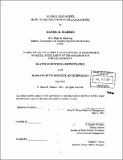Global managers : how to obtain them in organizations
Author(s)
Madero, Daniel R. (Daniel Ricardo), 1970-
DownloadFull printable version (5.630Mb)
Other Contributors
Sloan School of Management.
Advisor
D. Eleanor Westney.
Terms of use
Metadata
Show full item recordAbstract
We live in a global era; we can find the same products and services around the world. The barriers that used to exist have blurred or disappeared. In the past when we traveled from one country to another, there were many differences-cultural, political, social-and many times travelers had one or two bad experiences. Today things are easier, and countries are adapting to the global market and opening their doors to the world. Technology and Communications are two key factors in this globalization process. However, the people who develop and implement these factors are the ones who are helping the world to become a global marketplace. These people are the global leaders and managers--people who think beyond their cultural and social environments, people who are able to combine the needs of different countries into a single more homogenous need, people who lead organizations and countries as they improve their strategies and join the global era. This thesis highlights the different phases of globalization through which the world has lived over the years, from the trading era where people exchanged valuable goods with each other to the global era where the marketplace is a single global market. The thesis discusses the changes in industry and the various forces driving industry to make these changes, as well as tools to help evaluate the pressures for globalization. I consider globalization from three perspectives: the broad worldview, industry level, and then company or firm level and the different ways of doing business. Moving from the macro level to the micro level, I discuss the people who work in the organizations, those who are responsible for leading and managing the firm during its drive to become a global company. I present and discuss some of the skills needed and the tools that managers can use to facilitate their strategies. Then follows a discussion of some of the generic strategies that companies can pursue and the key success factors needed to develop appropriate global strategies. Next I develop a case study of Vitrocrisa, a Mexican company searching for an approach to globalization that will work best for the company. Here I explain the strategies, structure, and challenges that Vitrocrisa is facing. Also I suggest actions and plans that the company could pursue to facilitate the process. Finally, I present general conclusions about how a company can identify the skills of global managers, and then identify potential candidates, hire, and develop them.
Description
Thesis (M.B.A.)--Massachusetts Institute of Technology, Sloan School of Management, 2001. Includes bibliographical references (leaves 110-111).
Date issued
2001Department
Sloan School of ManagementPublisher
Massachusetts Institute of Technology
Keywords
Sloan School of Management.